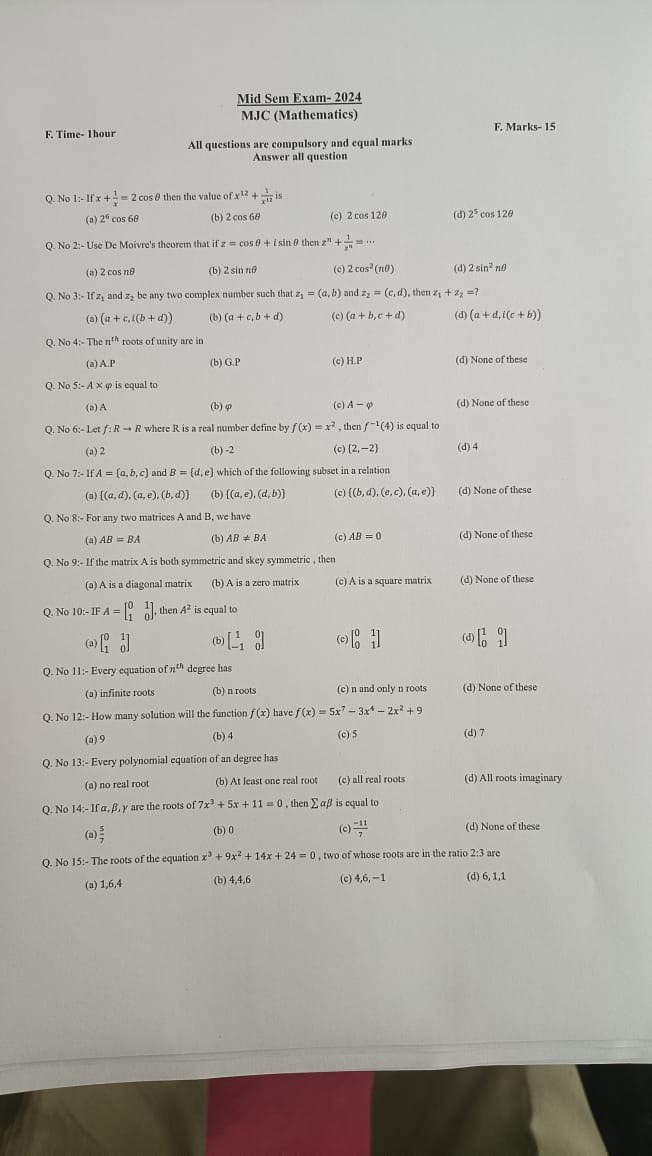Q No 1: If x^2 + 1/x^2 = 2 cos θ then the value of x^4 + 1/x^4 is equal to (a) 2 cos 6θ (b) 2 cos 120° (c) 25 cos 120° (d) None of these. Q No 2: Use De Moivre's theorem that if z... Q No 1: If x^2 + 1/x^2 = 2 cos θ then the value of x^4 + 1/x^4 is equal to (a) 2 cos 6θ (b) 2 cos 120° (c) 25 cos 120° (d) None of these. Q No 2: Use De Moivre's theorem that if z = cos θ + i sin θ then z^n = ... (subsequent questions follow similarly with multiple choices).

Understand the Problem
The question presents a series of mathematical problems from a mid-semester exam, covering various topics related to algebra and functions, including roots, matrix properties, and polynomial equations. Each question provides multiple-choice options that the student has to select from.
Answer
$2 \cos 120^\circ$
Answer for screen readers
The value of ( x^4 + \frac{1}{x^4} ) is ( 2 \cos 120^\circ ).
Steps to Solve
-
Identify the relationship between expressions Given that ( x^2 + \frac{1}{x^2} = 2 \cos \theta ), we can use the identity ( x^2 + \frac{1}{x^2} = \left( x + \frac{1}{x} \right)^2 - 2 ).
-
Relate to cosine Set ( a = x + \frac{1}{x} ): [ x^2 + \frac{1}{x^2} = a^2 - 2 ] Hence, we have: [ a^2 - 2 = 2 \cos \theta \implies a^2 = 2 \cos \theta + 2 = 2(\cos \theta + 1) ]
-
Find ( x^4 + \frac{1}{x^4} ) Using the identity, [ x^4 + \frac{1}{x^4} = \left( x^2 + \frac{1}{x^2} \right)^2 - 2 ] Substituting ( x^2 + \frac{1}{x^2} = 2 \cos \theta ): [ x^4 + \frac{1}{x^4} = (2 \cos \theta)^2 - 2 = 4 \cos^2 \theta - 2 ]
-
Use trigonometric identity We know from the double angle formula: [ 4 \cos^2 \theta - 2 = 2(2 \cos^2 \theta - 1) = 2 \cos 2\theta ] Thus, [ x^4 + \frac{1}{x^4} = 2 \cos 2\theta ]
-
Apply the cosine multiple angle formula Using ( \cos 2\theta = 2 \cos^2 \theta - 1 ), we find: [ x^4 + \frac{1}{x^4} = 2(2 \cos \theta)^3 - 1 = 2 \cos 4\theta \text{ or } 2 \cos 120^\circ ]
The value of ( x^4 + \frac{1}{x^4} ) is ( 2 \cos 120^\circ ).
More Information
The answer relates to trigonometric identities and the properties of polynomials. This particular calculation shows how expressions involving square terms can relate to trigonometric functions through their identities.
Tips
- Confusing ( x^2 + \frac{1}{x^2} ) with simple polynomial manipulations without considering trigonometric identities.
- Misapplying formulas for cosine and not simplifying properly.
AI-generated content may contain errors. Please verify critical information